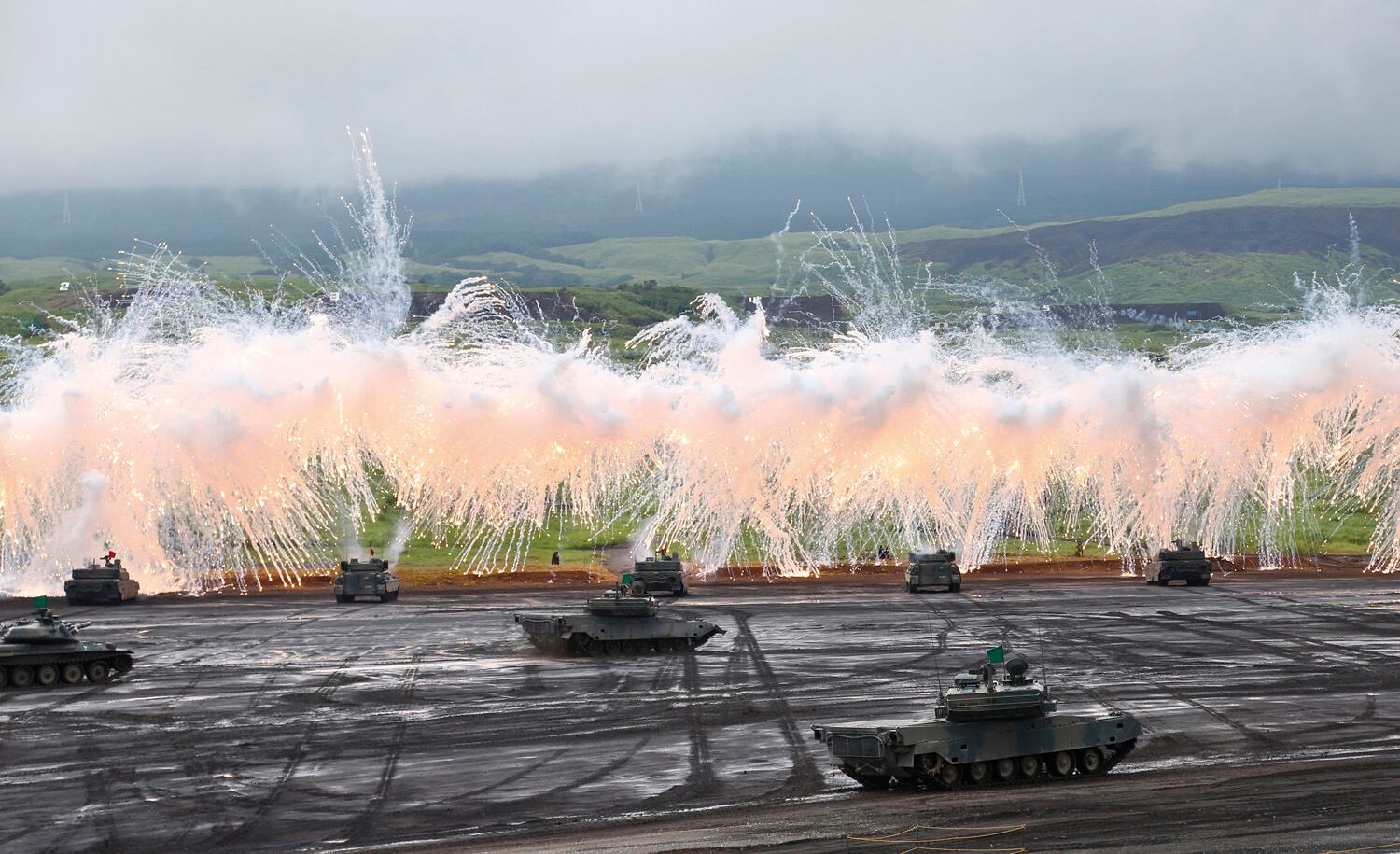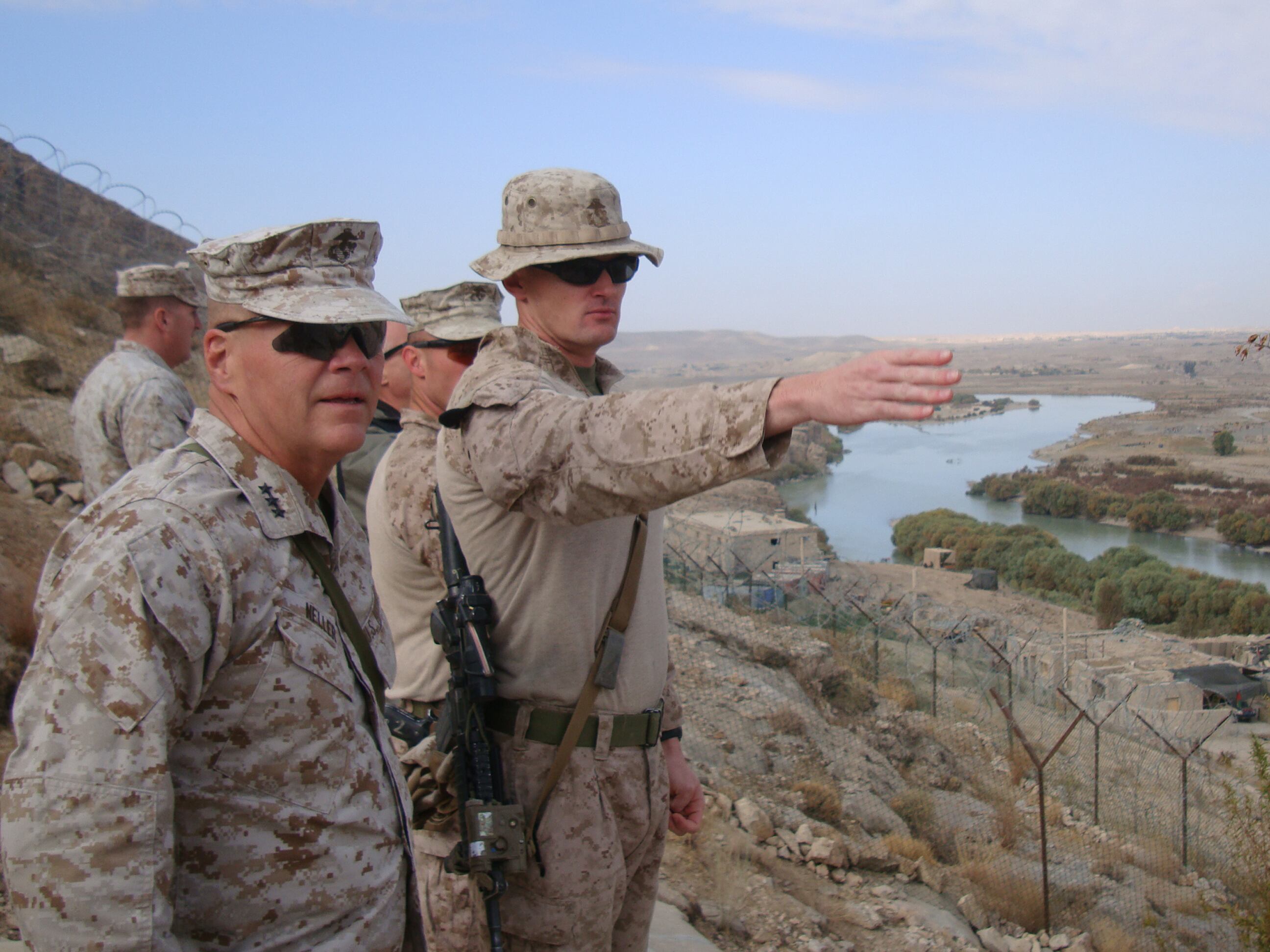![Lt. Gen. Neller visits MK Air Base[ID=29625429] ID=29625429](http://cdn.tegna-tv.com/-mm-/8d81891c33d77c64c5bc88d52df777c821f55a25/c=0-0-5107-3840&r=115x86/local/-/media/2015/07/02/GGM/MilitaryTimes/635714412452905821-1495919.jpg) It was a sweaty morning in 1998 at Rodman Naval Base in Panama. Then-Col. Robert Neller, a visiting regimental commander having just arrived in the country, was out on a run with troops from Fox Company, 2nd Battalion, 6th Marines. The company commander, Capt. Jeff Dill, eyed a rise in the distance known affectionately as "Suicide Hill," and decided to spare the senior officer and go around it.
It was a sweaty morning in 1998 at Rodman Naval Base in Panama. Then-Col. Robert Neller, a visiting regimental commander having just arrived in the country, was out on a run with troops from Fox Company, 2nd Battalion, 6th Marines. The company commander, Capt. Jeff Dill, eyed a rise in the distance known affectionately as "Suicide Hill," and decided to spare the senior officer and go around it.
AThen, all of a sudden, he felt Neller breathing in his ear. "How come you didn't go up the hill, captain?" Neller demanded. "You don't have the hair on your ass."
Not one to be silenced by a taunt, Dill immediately reversed course and took his company up the hill, eventually reaching the hilltop despite sustaining a number of heaving casualties involving "casualty" incidents from Marines who had overindulged the night before. When the run ended finished, Neller flashed a broad grin was grinning broadly.
"Good for you, captain," he said that morning in 1998. "You don't back down from a challenge."
Neller, now 62, was nominated July 1 to succeed Gen. Joseph Dunford as commandant of the Marine Corps commandant. Now a three-star general and the commander of Marine Forces Command in Norfolk, Virginia, the Iraq war veteran was a dark horse choice for the post of Marine Corps top officer, eluding Pentagon short-list predictions and surprising even those who work directly for him in his own command.
But those who've have known Neller throughout his 40 years of service say his keen intellect, strategist's mind and passion for leading and improving Marines make him the right choice to take charge of a service the helm of a Corps facing major transition the growing pains of personnel and equipment modernization and transition to a new era.
Neller himself was understated in his response to the nomination, which, pending Senate confirmation, comes with a fourth general's star.
"I'm greatly honored and excited about this opportunity to serve," he said in a statement provided to Marine Corps Times. "I'm looking forward to the confirmation hearing."
Dunford, who is has been nominated to become the next replace Chairman of the Joint Chiefs chairman of Staff Martin Dempsey when Dempsey retires this fall, enthusiastically recommended Neller for the Marine Corps' top post to the post enthusiastically.
"He has commanded and excelled at every level throughout his four decades of service," Dunford said. "He is a proven combat leader and an innovative, strategic thinker. He will take great care of our Marines, sailors and their families. Our Corps will thrive with Bob Neller at the helm."
Ready for anything
A native of East Lansing, Michigan, Neller has spent some two-thirds of his life as a Marine officer, earning his commission after graduating on from the University of Virginia via the rigorous Platoon Leaders Class Program in 1975.
An infantry officer by training, one of his first operational deployments came was to Somalia in 1992 when with 3rd Light Armored Infantry Battalion went to Somalia for in support of Operation Restore Hope, a humanitarian and peacekeeping mission meant to stabilize the country for humanitarian and peacekeeping operations. Even as a relatively young officer, Neller then had a reputation as a no-nonsense leader who loved Marines, but ran a tight ship and expected them to toe the line.
Christopher Nargi, a former radio operator who served under Neller as a junior enlisted Marine on that deployment, said troops had to be ready for anything when serving in his unit.
"He volunteered us for every freaking thing available," Nargi, now 42, recalled. "He wanted his troops to be the ones that led the way."
When not deployed, Nargi said, Neller liked to strike up conversations with junior Marines, quizzing them on military strategy and asking them how they'd respond tactically to a situation he presented to them. Some were intimidated by Neller's gruff demeanor, he said, but those who spent time with him found he had a wry sense of humor and an easy way of relating to his men, even those at the lowest ranks.
"Me and my Marine Corps buddies, we've been talking about it for years: There's gonna be a day that Neller was going to be commandant," Nargi said. "It's just surprising it took so long."
Neller loved the Spartan conditions and austere lifestyle embraced by Marines, said retired Lt. Col. Michael Schmidt, who attended The Basic School in Quantico, Virginia, in 1984 while Neller, then a captain, served there as a student company executive officer. He'd overhear the second lieutenants grumbling about the TBS "harassment package," Schmidt recalled, but never back down from the rigor of training. It was clear, Schmidt said, that Neller enjoyed to seeing how the young officers were transformed after extended exposure to the school's rough conditions.
"I'd say he was the type that would smile in the worst of conditions, but he was also the type of Marine that never smiled," Schmidt, now a channel advancement manager at the Vermeer Corporation, said.
'We call him Cuddles'
Neller would go on to hold a host widely varied of Marine Corps leadership posts, ranging from director of operations for Marine Corps Plans, Policies and Operations at the Pentagon to president of Marine Corps University and deputy commanding general of operations for I Marine Expeditionary Force (Forward) in Iraq from 2005 to 2007. Most recently, Neller completed a tour overseeing all Marine Corps operations in the Middle East as commander of Marine Corps Forces Central Command.
But he never lost his hard-bitten manner, or his interest in hearing from young Marines bold enough to approach him. Former commandant Gen. James Amos ribbed Neller about this apparent contradiction when he handed off command of MARCENT to Lt. Gen. Kenneth McKenzie last year.
"For those of you here who think he is just crusty and you fear approaching him and he has that snarly look on his face and you just live in fear and you get, it's like you get acid in your stomach when you approach him — it's like three dozen cappuccinos all at one time in your stomach — those of us who know him call him Cuddles," Amos said, according to a report from the Tampa Bay Tribune. "Because deep down in that crusty heart of his is a heart of gold."
Neller's aide-de-camp at MARCENT, Maj. Peter Munson, said he was moved during a Thanksgiving visit to forward operating bases in Afghanistan to see Neller address deployed troops like an affectionate football coach. He'd gather them into a huddle and place hands on their shoulders while offering brief messages of encouragement, Munson recalled.
When he talked to individual Marines, Munson said he'd pull them aside and away from the entourage, more interested in a frank conversation than a photo opportunity or meet-and-greet. And the general remembered those meetings, too. In 2012, Neller wrote a Veterans Day blog post for the Marine Corps Gazette in 2012 recounting a quiet meeting six years earlier with Lance Cpl. Tyler Christ, a Marine standing watch at a small observation post on the road from Fallujah to Habbaniyah, Iraq. Neller wrote that he was touched by Christ's account of losing a Marine to a roadside bomb the day before, and inspired by his commitment to his duty despite the loss.
Munson, who retired in 2013 and now works as Global Head of Emerging Risks and Crisis Logistics at Citi, said he'd also been impressed by Neller's refusal to embrace the perks afforded a general officer or assume an attitude of superiority because of his rank.
"He acts as a general officer in a professional manner, but as far as any expectations of personal servitude, he acts like any brand new officer: 'don't carry my bags,'" Munson said. "He never forgot leadership by example."
Moneyball for Marines
Neller's selection to succeed begins to emerge as a logical successor for Dunford is all the more logical when examining his approach to making and deploying Marines is examined more closely.
He would take command of a Marine Corps in transition for the second time in as many years. Dunford, who became commandant came to the helm less than a year ago, succeeding Amos in October. Prior to his nomination to succeed Dempsey as chairman of the Joint Chiefs, Dunford had only just begun to implement a transformational strategy for the service, one focused anchored on developing the service's better-trained, more mature non-commissioned officers while increasing the percentage of and changing the makeup of the force to increase the number of senior enlisted Marines. Those moves are intended to better prepare the Corps for increasingly technical challenges, such as cyber warfare, and to equip Marines to man more sophisticated gear and equipment.
At the same time, Dunford established working groups to help Marines in ground combat fields make better use of cutting-edge aircraft technology, including the MV-22 Osprey and the F-35B Joint Strike Fighter, saying those platforms gear could change the way Marines fight for good.
Neller has a similar interest in improving combat effectiveness at the level of the individual Marine and the unit, Munson said. He often referred to the concept of "moneyball for Marines," a reference to a strategy made popular by baseball general manager Billy Beane. Beane eschewed conventional techniques and strategies used by teams to select ball players, focusing instead on the players' contribution to winning the game. Neller favored a similar wide-lens approach, Munson said.
"It was, trying to be more rigorous in the way that we select, train, and then continue to select Marines from positions of responsibility and special duties and specific jobs," he said. "It's making sure we understand what the qualities are that make units more effective."

Neller's priorities
Like Dunford, Neller has a keen interest in improving professional military education, said Dr. Jerre Wilson, a retired Army colonel who served as vice president for Academic Affairs at Marine Corps University while Neller was president there. One of Neller's priorities during his tenure at the school from 2009 to 2010 was improving enlisted PME to be more like officer PME, emphasizing classroom discussions in the style of the Socratic method over classroom lectures.
With his experience in Iraq and at MARCENT, Wilson said, Neller promoted was also able to promote updates to MCU curricula to make its teaching on the Middle East and current foreign policy more accurate and relevant.
"I think his decision-making ability is what really impressed me," Wilson said "He's very well grounded professionally as a warrior, as an educator and as a Marine. He has the ability to judge when decisions need to be made, when he has time to make decisions, and act accordingly."
Neller also brings with him a nuanced understanding of joint Navy-Marine Corps operations thanks to his year at MARFORCOM, where he worked closely with Navy partners to create more efficient shipboard deployment plans and finding new ways to use seabasing vessels that are being built to account for a shortage of amphibious ships.
"[The Marines and the Navy are] kind of pushing each other hard to do this as much and as often as we can," Neller said of carving new training opportunities out of planned floats in an April interview with Marine Corps Times.
Less clear is how Neller might fare with the political challenge of being commandant, which requires extensive interaction with lawmakers during testimony on Capitol Hill, and collaboration with service and defense department leaders. Those who know Neller say he can be surprisingly blunt and sometimes polarizing for that reason. He may present a contrast to Dunford, a more soft-spoken officer who came to the post having previously served at the Pentagon as assistant commandant.
No one, however, doubts Neller's commitment to caring for Marines.
Most recently, Neller also spearheaded a campaign for all East Coast Marine bases aimed at reducing alcohol abuse in the ranks, appealing Marine enlisted leaders to encourage the troops under them to protect themselves from professional and legal consequences by exercising moderation.

"You say we're the nation's force in readiness, which we are, and we have to be ready. And any behavior which doesn't contribute to that, I think we need to take a look at it," Neller told Marine Corps Times in April said of the effort.
This focus on the well-being of the individual Marines stands out is what makes Neller memorable to those who served with him, even decades after the fact. Dill, who led that memorable run in Panama 17 years ago, would go on to retire as a colonel in 2014. He said he never lost touch with Neller and strove to model his own career after the general's.
Dill said he was thrilled to see Neller nominated to lead the Marine Corps, and only wished he could have served under a Neller commandancy.
"I wrote my wife, 'if there's ever a time I regretted hanging up my spurs, today might be the day,'" Dill said.

Capt. Richard S. Jahelka, Echo Company commander, 2nd Battalion, 7th Marines, shows Lt. Gen. Robert B. Neller the battle space outside Forward Operating Base Zeebrugge in Afghanistan's Kajaki district.
Photo Credit: Gunnery Sgt. Joseph L. Loewy/Marine Corps




